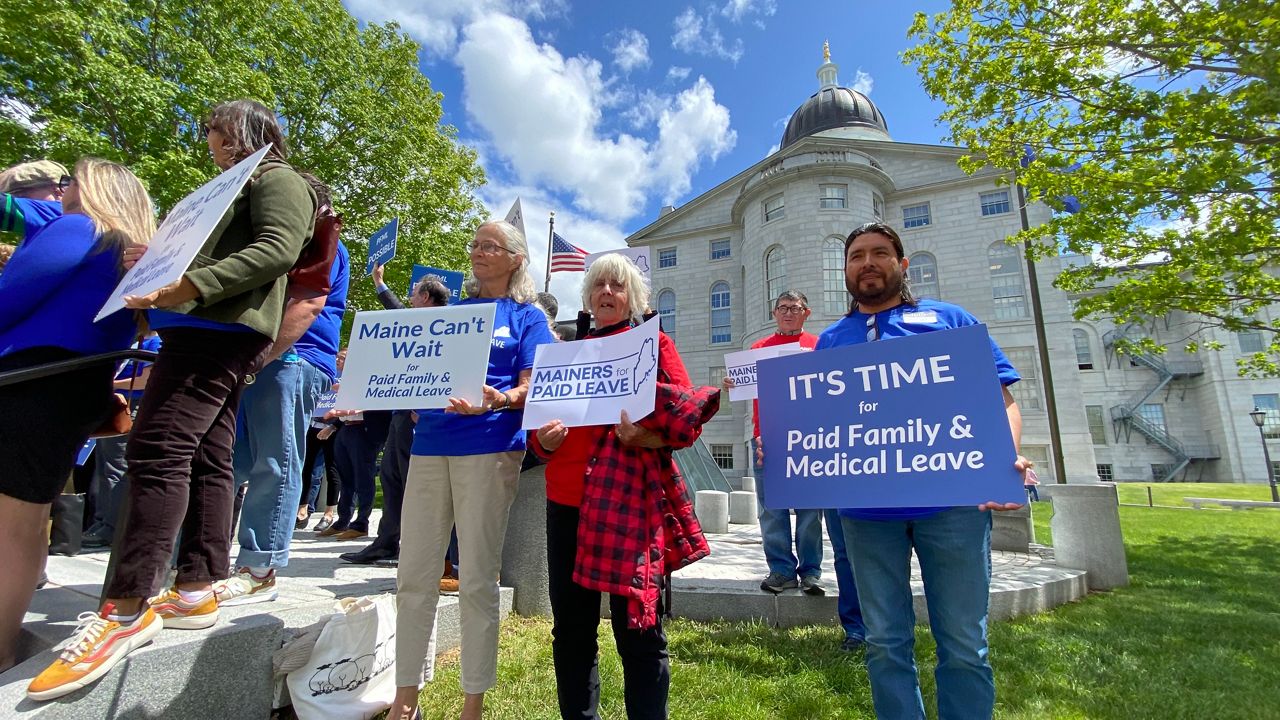Regina Rooney took paid time off from work to care for her mother when she was dying of lung disease.
She feels fortunate that her employer, the Maine Coalition to End Domestic Violence, allowed her to take the time she needed to organize medications, meals and visits by hospice care.
She knows others don’t get paid family and medical leave, so she was one of dozens who came to the State House Thursday to urge legislative support for a new program.
“I know many people care for their loved ones while working full-time and then some and I cannot fathom the cruelty of that,” she said. “Trying to do both would have wrecked me. Paid leave saved my mental health.”
Rooney and others are backing LD 1964, which seeks to create a new program that would require Maine employers with more than 15 employees to participate in a paid family and medical leave program.
Sponsored by Sen. Mattie Daughtry (D-Brunswick) and Rep. Kristen Cloutier (D-Lewiston) the bill calls for up to a 1% payroll tax on wages split evenly between employers and employees.
It would allow workers to take up to 12 weeks of paid leave to care for a newborn, a family member with a serious health condition, a child placed in the home through foster care or a short list of other reasons.
The benefit amount would be 90% of the worker’s average weekly wage.
Thirteen states have paid family leave programs, but their designs vary state by state.
Business groups in Maine oppose the bill, saying it comes during a workforce shortage and at a time when companies cannot afford a new mandate.
Peter Gore, a lobbyist for business interests, said many of them want some form of paid leave program. But the current proposal doesn’t work.
“It’s a cost issue for sure,” he said. “It’s a very generous benefit structure. It’s far more generous than what’s in the rest of New England.”
In some other states, only the employee pays in or if the employer pays a portion, it typically only covers medical leave, not family leave, Gore said.
And though the Maine proposal exempts employers with fewer than 15 employees from the program, the workers can choose to pay in and be eligible for the paid time off.
That’s a major concern for employers, he said.
“We have an acute workforce shortage here,” he said. “You can’t find full-time workers. How are small businesses going to find workers for just 12 weeks, knowing that at the end of 12 weeks they are gone.”

The bill faces other hurdles as well.
It’s not yet clear how much it would cost to start the program. Daughtry said the state would likely solicit bids from companies to run the program, rather than add it to the duties of the Department of Labor.
Daughtry and Cloutier said they have visited more than 300 businesses across the state to try to reach a compromise on the bill.
“Maine needs this,” Daughtry said. “We have truly built this policy together. It is collaborative, it is creative, it is innovative, and we have worked on it harder than any other state.”
Many Republicans are opposed, calling it “a new tax on Maine workers and businesses.”
“At a time when everyone is struggling with rising prices and inflation, we should not be adding to that burden by taking more money from their paychecks weekly for a program that they may never use,” said Rep. Joshua Morris (R-Turner).
And while Democrats have the House and Senate majorities needed to pass the bill without Republican support, there is another consideration as well.
The Maine Women's Lobby and others have gathered signatures to put a similar paid family and medical leave proposal out to voters in 2024.
If the Legislature fails to pass the bill in the next month, the groups are prepared to turn in their signatures to call for a public vote, said Destie Hohman Sprague, executive director of the Maine Women’s Lobby.
“My strong preference is to have a legislative path,” she said. “A legislative solution is a durable way to hammer out the details together.”
But if that doesn’t happen, the petitions are “all crated up and ready to go.”









)